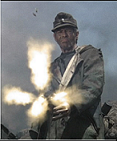Capt. Harlock
Posts: 5358
Joined: 9/15/2001
From: Los Angeles
Status: offline

|
150 Years Ago Today:
Abraham Lincoln penned one of the more unusual notes to a new army commander:
EXECUTIVE MANSION, WASHINGTON, D.C., January 26, 1863.
MAJOR-GENERAL HOOKER,
GENERAL: I have placed you at the head of the Army of the Potomac. Of course I have done this upon what appears to me to be sufficient reasons, and yet I think it best for you to know that there are some things in regard to which I am not satisfied with you. I believe you to be a brave and skilful soldier, which of course I like. I also believe that you do not mix politics with your profession, in which you are right. You have confidence in yourself, which is a valuable, if not indispensable, quality. You are ambitious, which, within reason, does good rather than harm; but I think that during General Burnside’s command of the army you have taken counsel of your ambition and thwarted him as much as you could, in which you did a great wrong to the country, and to a most meritorious and honorable brother officer. I have heard, in such a way as to believe it, of your recently saying that both the army and the government needed a dictator. Of course it was not for this, but in spite of it, that I have given you the command. Only those generals who gain success can be dictators. What I now ask of you is military success, and I will risk the dictatorship. The government will support you to the utmost of its ability, which is neither more nor less than it has done and will do for all commanders. I much fear that the spirit you have aimed to infuse into the army, of criticising their commander and withholding confidence from him, will now turn upon you. I shall assist you as far as I can to put it down. Neither you, nor Napoleon, if he were alive again, could get any good out of an army while such a spirit prevails in it. And now, beware of rashness. Beware of rashness, but, with energy and sleepless vigilance, go forward and give us victories.
Yours, very truly,
A. LINCOLN
In your humble correspondent's opinion, Lincoln missed the most important point. The spirit then prevailing in the Army of the Potomac was antagonism to virtually everything about the Army, not just criticism of their commanders. Poor equipment and worse food were the order of the day, drunkenness and desertion were rife, and morale was at an all-time low after Fredricksburg and the Mud March. Hooker would have his work cut out for him to get the Army ready for another campaign -- but to the astonishment of many, he would prove to be the man for the job.
_____________________________
Civil war? What does that mean? Is there any foreign war? Isn't every war fought between men, between brothers?
--Victor Hugo
|
 Printable Version
Printable Version



























 New Messages
New Messages No New Messages
No New Messages Hot Topic w/ New Messages
Hot Topic w/ New Messages Hot Topic w/o New Messages
Hot Topic w/o New Messages Locked w/ New Messages
Locked w/ New Messages Locked w/o New Messages
Locked w/o New Messages Post New Thread
Post New Thread